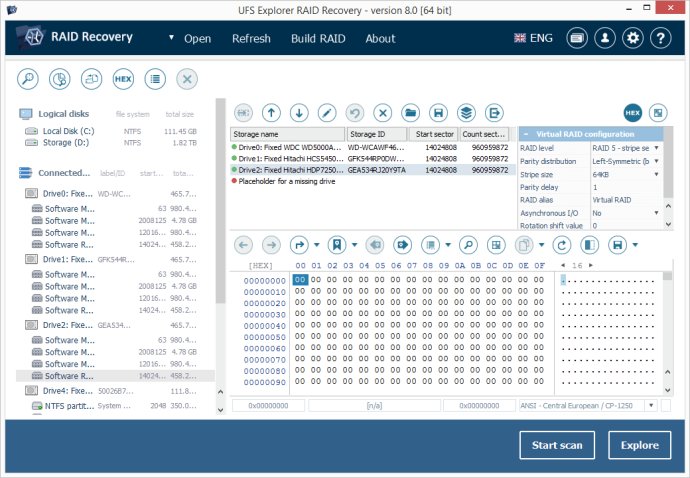UFS Explorer RAID Recovery is a highly effective software for recovering data from RAID systems, including customized setups, while effectively managing faulty disks. It specializes in RAID data recovery and flawlessly reconstructs all types of RAID configurations, resolving data loss problems efficiently.

The software's user-friendly interface is one of its standout features, offering a wide range of helpful options for the data recovery process. Users can take advantage of features such as file sorting, search, filters, preview, indication of a state, and more. Moreover, the software supports a diverse range of file systems used in Windows, macOS, Linux, BSD/Solaris, and is equipped to handle modern storage technologies like msadm, LVM, LDM, MS Storage Spaces, Drobo BeyondRAID, and others.
An additional noteworthy feature of UFS Explorer RAID Recovery is its capability to build RAID in virtual mode, edit RAID parameters, and save them for future use. In addition, it includes an embedded hexadecimal viewer, allowing users to perform quick data analysis on partitions and disks.
The software also offers an extensive set of tools for managing damaged drives. Users can define settings related to access and usage of a storage device, create full or partial disk images with customizable parameters, and define rules to omit bad blocks. Drives and arrays with bad blocks can be processed using bad sector maps generated during imaging or through pattern recognition, as well as maps created with other compatible tools.
Furthermore, UFS Explorer RAID Recovery is not limited to RAID system recovery alone, as it can also be used to recover data from various other storage devices such as PCs, laptops, flash drives, memory cards, external hard drives, virtual machines, disk image files, and more. The software supports popular virtual technologies like VMware, Hyper-V, VirtualBox, QEMU, XEN, and Parallels, and is capable of handling disk images of Apple, EnCase, R-Studio, and other formats.
In conclusion, UFS Explorer RAID Recovery is an exceptional software that provides comprehensive and reliable solutions for all data recovery needs. Its extensive array of features and ability to work with any storage device make it an essential tool for IT professionals and individuals alike.
Version 10.5:
Added ZFS pool builder GUI:
- Added GUI to view/edit ZFS pool configuration, including Vdevs, RAID-Z level and members etc.;
- Possibility to assign components manually (after metadata damage) and force placeholders on place of missing components;
- Added 'New ZFS pool' function under 'RAID' ...
Version 10.3:
Reworked 'Save with filter' GUI: different filters separated to 'tabs', target path was made editable;
Also reworked 'folder exclusion' mask as a separate setting;
Added indication of ZFS pool component properties (vdev, RAID configuration, RAID-Z member, pool ID etc.);
And more.
Version 10.2:
* 'Open device (advanced)' function now has setting for maximum IO block size (to support limitations of some adaptors);
* In disk imager (ATA mode) - fixed issues with read errors caused by mis-aligned buffer;
* SDLSP format now has native support of extended sector sizes (such as 520, 528,
Version 10.1:
Support of RAID0+1 configurations of HP SmartArray controllers (version 1 metadata)
Support of RAID0 configurations on RAID components of different sizes (dynamic adjustment of rotation)
Media Manager: support of WD MyCloud NAS and WD MyCloud Home storages
Reworked ReFS support module
And more
Version 9.18: multi-volume Drobo DAS, disk imager, viewer archive file, scan result, folder metadata
Version 9.17:
* Saving disk image files to E01 (EWF) format...
* HFS+ scan: better reconstruction of lost folder names from journal;
* ExFAT scan: removed duplicate 'green'/'yellow' file systems in result.
Version 9.15:
* Saving disk image files to E01 (EWF) format...
* HFS+ scan: better reconstruction of lost folder names from journal;
* ExFAT scan: removed duplicate 'green'/'yellow' file systems in result.
Version 9.14:
* Saving disk image files to E01 (EWF) format...
* HFS+ scan: better reconstruction of lost folder names from journal;
* ExFAT scan: removed duplicate 'green'/'yellow' file systems in result.
Version 9.13:
* Microsoft Storage Spaces:
- Added support of 'type 6' virtual disk descriptor records;
- Fixed issue with support of 'type chunk' records (format version 3 and above);
* Fixed issue with resumption of 'scan status' (ssdb) of RAID-Z scan;
...